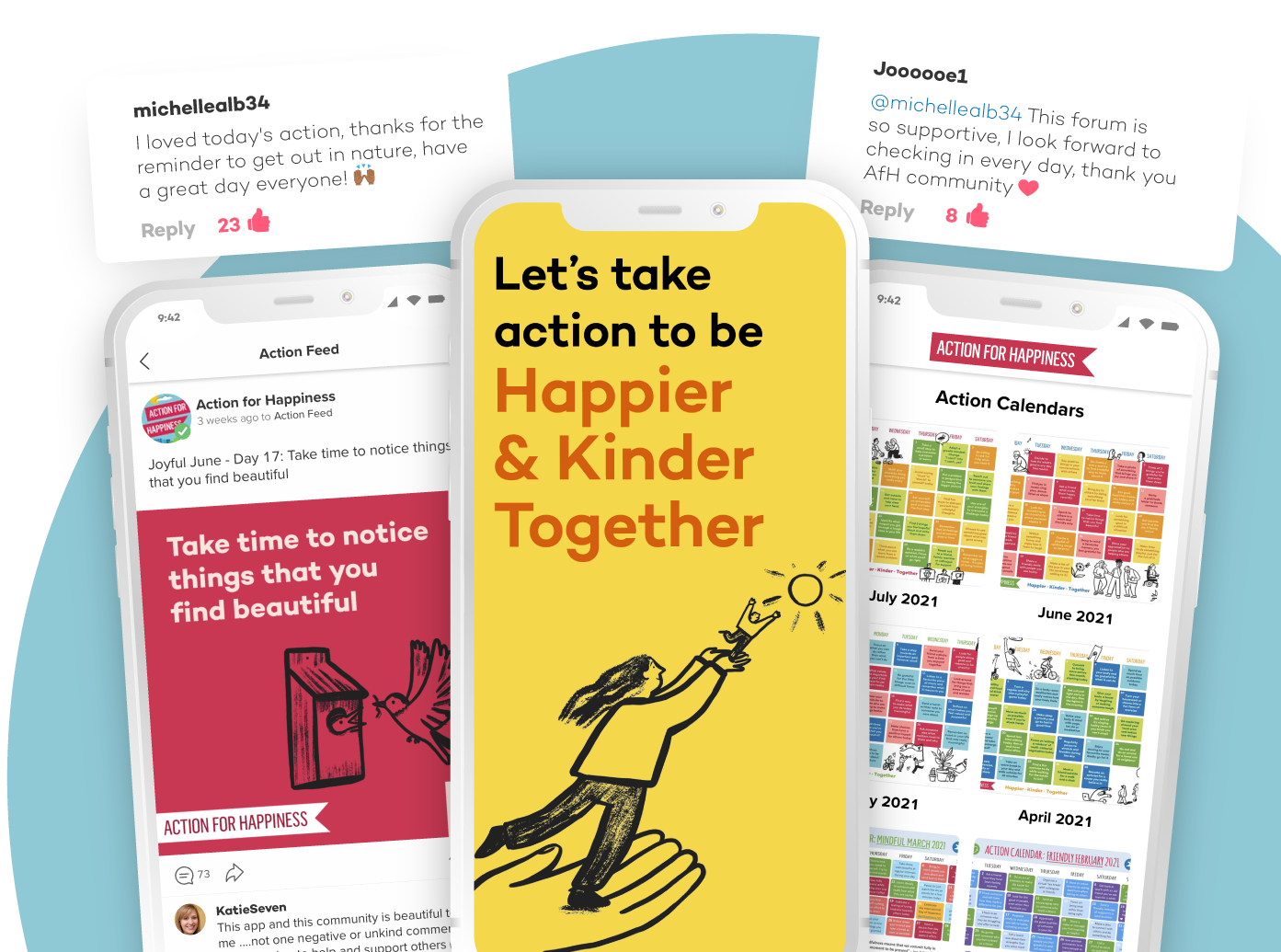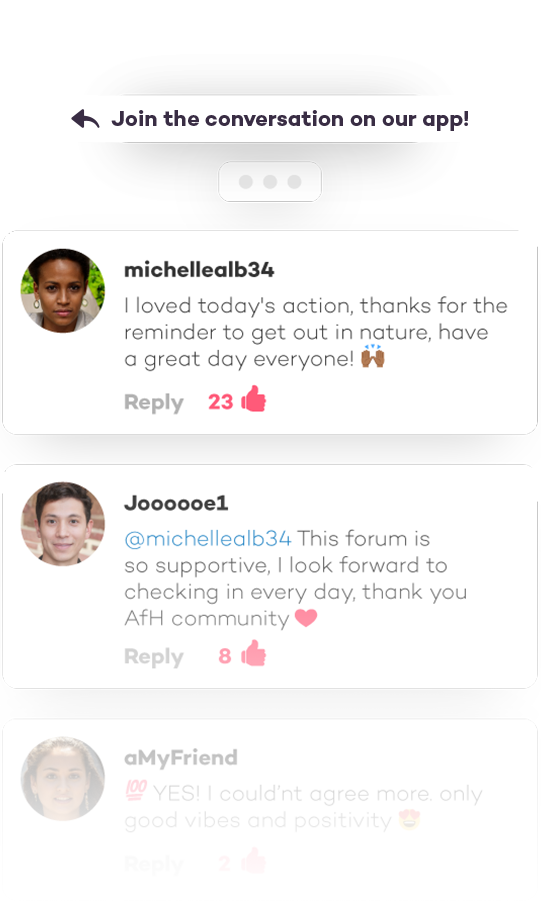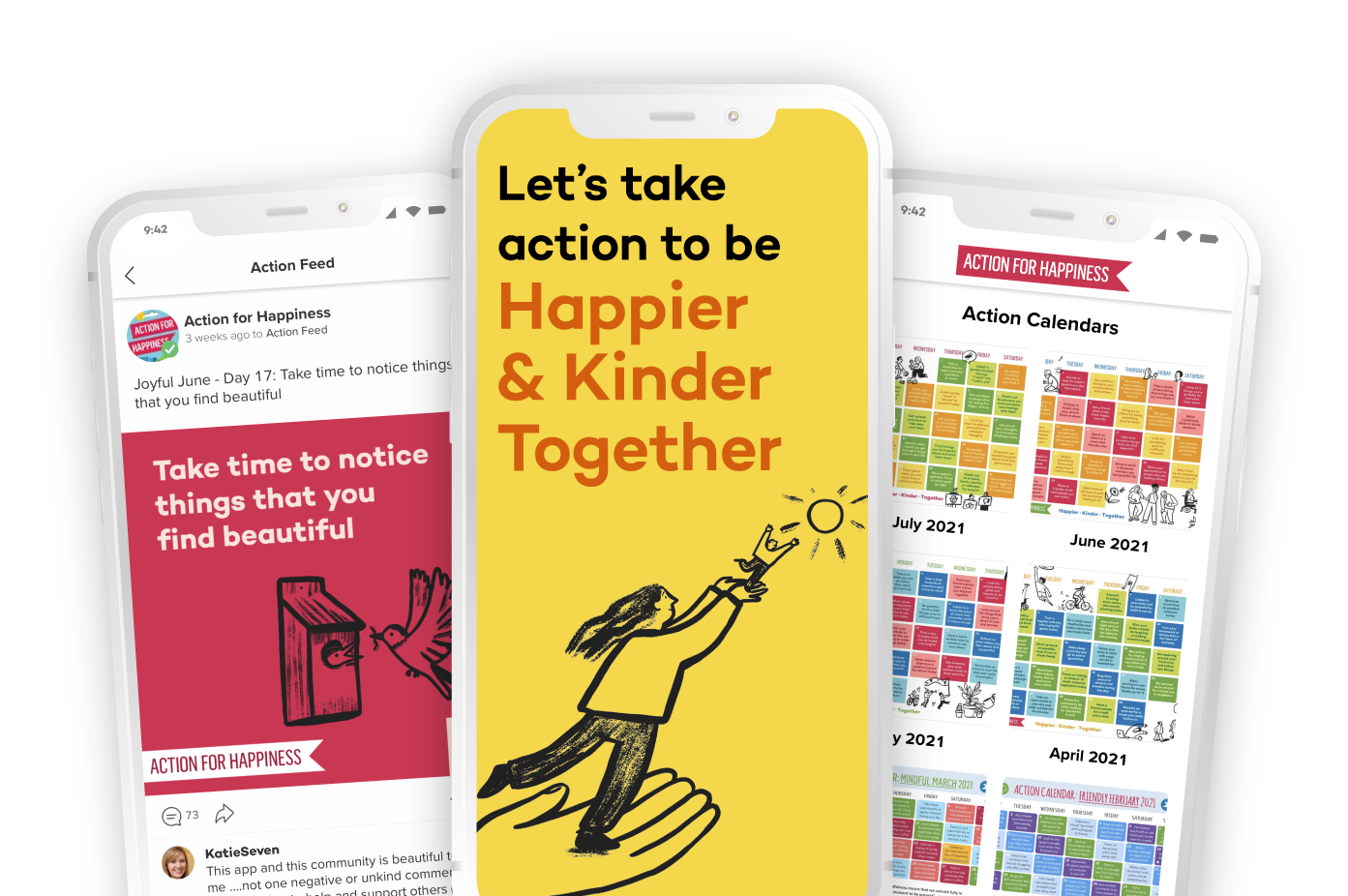Happiness Habits Volunteer FAQ
Happiness Habits is a secular, science-based course for people who want to learn how to live happily and spread happiness to those around them. It was created to help people tune in to what really matters in life, connect with people around them and find small ways to start taking action.
It is run by pairs of volunteers and lasts for six sessions (one per week - usually weekday evenings) for groups of 10-20 members of the public (who are usually relatively local). The course is either run in-person in a suitable venue or can be run online on Zoom to great effect (meaning people can join from anywhere.
People find it really valuable and often refer to what they learn on the course as life-changing.
Below you can find answers to our most commonly asked questions:
What is the content of the course?
The sessions cover what we see as six of the most fundamental aspects of what it means to live a happy life. Each session features expert videos, mindfulness practices, group exercises and small actions for participants to try out between sessions.
The course features input from 15 world-leading experts:
Week 1: Gratitude
What can we learn about happiness? Vanessa King - Head of Psychology, Action for Happiness
How can we become happier? Shawn Achor - Bestselling Positive Psychology Author
Week 2: Self-Care
How can we be kinder to ourselves? Kristen Neff - Professor of Psychology, University of Texas
How can we get the basics right? Rupy Aujla - General Practice Doctor and Healthy Eating Expert & Darryl Edwards - Movement Coach and Author
Week 3: Relationships
Why are relationships important for our happiness? Robert Waldinger - Professor of Psychiatry, Harvard Medical School
How can we look after our Relationships? Roxy Manning - Psychotherapist and Nonviolent Communication Expert
Week 4: Resilience
How can we be more resilient? Tal Ben-Shahar - Positive Psychologist, Harvard University
How can we be happy in dark times? Maria Sirois - Positive Psychologist and Author
Week 5: Kindness
How can we become kinder? Matthieu Ricard, Buddhist Monk and Author
Why does kindness matter? Chude Jideonwo - Journalist and Entrepreneur & Nipun Mehta - Founder of Service Space
Week 6: Meaning
What makes life meaningful? Gretchen Rubin, Bestselling Author
What should be the purpose of our lives? Jon Kabat-Zinn - Professor of Medicine, University of Massachusetts & Richard Layard - Economist, London School of Economics

Who is the course for?
This course is for anyone interested in exploring how to create happiness for themselves or others. Maybe someone who could do with some new approaches to try out in their own life or someone passionate about creating happier communities and a happier world.
We want the course to be available to all, so that’s why we’ve designed it to be open to anyone (aged 18 and above) from all sorts of backgrounds.
Please note: this course is not group therapy, if someone is experiencing severe challenges at the moment we recommend they seek alternative professional support.

How many people can sign up to a course?
We allow a maximum of 24 people to sign up to each course - any higher and we feel the quality of the experience would be impacted (for example group check-ins would take ages!).
We also set a minimum number of 8 also - so you need to have at least this many signed up by the start of week 1 for the course to go ahead.
We don’t allow people to join the course part way through as the sessions build on one another week by week and we prefer people to experience it as a whole.

Is the course free to attend?
Everyone who joins the course makes a ‘donation of their choice’ to be there and we welcome everyone on the course equally whatever they are able to give. Participants can choose to either give the recommended donation of £60 or give more or less depending on their circumstances.
Although the volunteers are unpaid, collecting donations is necessary for maintaining the website and booking system as well as paying for the promotion of the course and the development and maintenance of materials.
If someone can't make a donation online or needs a place on the course without making a donation then they can email us for a free place (we won’t turn anyone away).

How do we support vulnerable people?
Due to the nature of the work we are all doing at Action for Happiness the movement sometimes attracts people who have very low levels of wellbeing. It’s OK not to be OK and we welcome people of all kinds to join our courses - however, sometimes a person is not in the right place to be able to participate and would be better suited to professional support.
We have guidance below on how to respond should there be a need like this in one of your sessions, but the key is to remember that you are not expected to be an expert in mental health or to have all the answers or solve someone else’s life problems.
Situations like this are an opportunity to practise compassion for the person who is suffering by signposting them towards help that will be more appropriate for them.
https://www.actionforhappiness.org/safeguarding
We collect wellbeing data on everyone who signs up to the course and our Safeguarding Manager is on hand to reach out if there are any concerns.

Who developed the Happiness Habits course and how does it relate to the previous Exploring What Matters course?
The course is developed by the Action for Happiness team, and it is based on everything we’ve learnt that makes the biggest positive difference, underpinned by the knowledge of many experts in the field of wellbeing.
Our previous course ‘Exploring What Matters’ was evaluated by Oxford University and the London School of Economics who found that it can raise your life satisfaction more than getting a long-term partner or finding employment.
The trial also found the course significantly decreased depression and anxiety and increased pro-sociality - meaning that participating in the course can make people more likely to act in ways which help others.
'Happiness Habits' is an evolution of the 'Exploring What Matters' course, building on what worked well in the content and structure, with up-to-date expert input about the science of wellbeing.

Why can’t I run it on my own?
Every course has to be run by at least two approved volunteers who are both committed to attending all six sessions. There are several reasons for this:
- The course sessions involve a very tight schedule and a combination of facilitation and technical skills (it is far easier to run with at least two people).
- With more than one person on hand there is the possibility of a participant getting one-to-one support without having to stop the session for others.
- Should one of you be unavailable (e.g. unwell) the session can still continue (perhaps with someone else in the group stepping up temporarily as a supporter).
- Having more than one facilitator brings a certain amount of diversity of voices into the room, which can be helpful in encouraging contributions from the group.

What if I don’t have someone to run it with?
We can do a local call out for other Action for Happiness supporters nearby to match you with. Our ability to do this does vary by location - but we have been quite successful in the past and it can be a wonderful way to make a new friend.

When can I run the course?
As soon as you and your co-volunteer have completed the volunteer training you can then pick your course start date.
We recommend a minimum of four weeks run-up time to be able to promote the course and make sure there are enough people there.
You also need to select six weeks where you both be able to make the same two-hour slot each week (e.g. Thursdays at 6pm).

How much time will it require from me (and will I have to do work outside of the sessions)?
Overall, it will require 20 - 28 hours of your time. This will include time spent facilitating your sessions as well as the time needed for promotion, preparation with your co-volunteer and communicating with attendees.
Before the COURSE (2 - 4 hours Total):
Connecting with your co-facilitator, reviewing the supporting resources, promoting the course in your community, and welcoming participants by email.
Before each SESSION (30 - 45 mins per week):
Sending out invites for the sessions, reviewing the materials for that week and checking in with your co-facilitator. Preparing the room and rehearsing the tech (or just checking the Zoom functions if running online).
During each SESSION (2 hours per week):
Greeting people as they arrive, sharing the slides, introducing exercises, holding group conversations, and keeping things to time.
After each SESSION (30 - 45 mins per week):
Checking-in with your co-volunteer, sending out thanks and inspiration to the group, following up directly with vulnerable people, and letting us know how it went.

How is each course promoted?
We do everything we can to help promote courses and ensure that they get as many participants as possible. This includes emailing people we know nearby and taking out paid ads on social media. However, our ability to recruit participants varies by location and it’s vital that facilitators get out and promote their group too.
We advise volunteers to think about promoting the course as 'community building' where we use the power of word of mouth and our existing connections to invite people locally to join us in making the course happen.
We invite all volunteers to think of at least three people that they know personally who they would like to have join them and reach out to those people.
It helps to tune into what really inspires us about the course, why we are choosing to volunteer our time to offer it and why we're calling on people to come together for it. This way we can inspire others in turn.
It can also be helpful to think practically beyond word of mouth, for example by sharing regular posts on social media, getting creative locally by finding clever places to put up posters in supermarkets and community centres or getting support from local media and institutions.

Can I adapt the course (e.g. to run it in my school or workplace)?
We ask our volunteers not to adapt the content of the course. It’s been carefully designed to create a safe, positive space and an engaging, action-focused learning journey.
That said, there is flexibility around the timings and approach of activity if needed. For example, if there is a reluctance in people to speak aloud, the facilitators can invite more discussion in the chat feed.
This course has been designed to run in public-facing settings - so you are welcome to run a public course and invite colleagues from your school (18 years old +) or workplace along.

Can I run it in a language other than English?
Currently, the course materials, sign-up procedures, terms and conditions and emails are all in English, so it is required that all participants have a sufficient grasp of English to interact with these effectively.
However, if running the course in locations where English is not the first language, group discussions can be conducted in other languages (as long as the whole group agrees to this).

Can I run the course in-person?
Yes, absolutely. There is a bit more organising involved in running in-person courses (e.g. finding a venue and agreeing on expenses) but there are advantages to being in a physical space running the course too.
We continue to support excellent online courses as well. You will need to decide together with your co-leader which format of course suits you both best.

What training and support will I get to run the course?
The training starts with our 4-session online Volunteer Training which will help ground you in the basics of being part of the Action for Happiness Movement.
When that is complete you gain access to our online volunteers community where you can connect with others and ask questions - as well as being able to join monthly volunteer check-in calls.
Once you apply to run a course you will be invited to a review call with our volunteer manager who can answer your questions and share some useful ideas.
Throughout the course journey we will be in email contact with you sharing everything you might need and answering questions as they come up.
Then for each session we have written a helpful step-by-step guide to make it super easy to run.
All together you should feel very well supported and confident in running your course!

What impact does the course typically have (do you have any testimonials)?
Data gathered already shows a significant positive impact of the course on life satisfaction and happiness levels. Here is a small selection of positive feedback people have given after completing the course:
- "I loved the community feel of the group. We were able to connect very quickly and it felt like a very safe space to talk openly."
- "Materials were excellent, simple... easy to understand and put into action."
- "I genuinely looked forward to the sessions and always felt better- more uplifted and positive- after them."
- "It felt like we had developed a group of people with a common sensitivity to other people's happiness built on a confidence to expose our own vulnerabilities."
- "I now think about what I am grateful for and I now smile more - sending out a ripple of happiness."
- "I realised that I am not alone in my anxieties and concerns. I now find that I am less self critical."
- "I'm definitely joining the 10 keys group with the participants as we don't want to lose touch with each other. Intimate sharing and learning and growth... led to wonderful bonds being formed."
- "Even though I'm going through a difficult time at the moment, the course helped me in many ways."

What is the relationship between courses and groups?
The Happiness Habits course has been designed to be the best first step for both volunteers and participants as it provides a really good foundation in Action for Happiness thinking and practice.
However, often when people finish a course they want to find a way to stay connected - and in that case the very best thing to do is start or join an Action for Happiness group.
https://actionforhappiness.org/groups
Staying in contact with others in the movement is one of the best ways of keeping yourself connected to our mission and reminding yourself to take positive actions.
If you are already involved in running a group, you can either continue whilst you run your course (assuming they don't fall on the same dates) or pause your group temporarily.
Also if your course participants are keen to form a group, but you don’t have the time personally, you can encourage a participant to step up by recommending they try out the Volunteer Training.
https://actionforhappiness.org/volunteer

How many courses can I run?
There's no expectation regarding how often a volunteer can run a course. If you would like to run one course and no more that is fine, although many people do choose to do more.
We do recommend running no more than one at a time though - so that each gets your full attention.


Download the FREE Action for Happiness app for iOS or Android
Gives you friendly nudges with an action idea each day Sends you inspiring messages to give you a boost Helps you connect & share ideas with like-minded people





